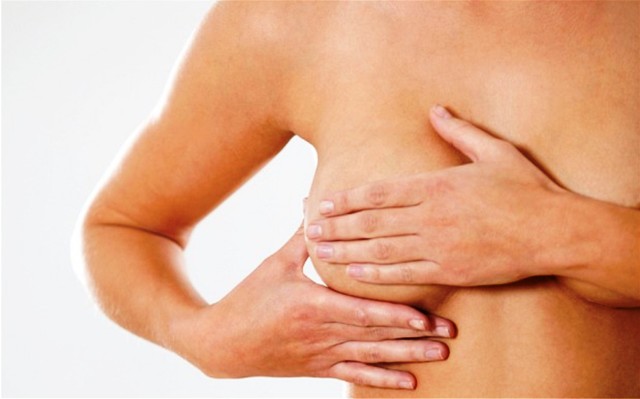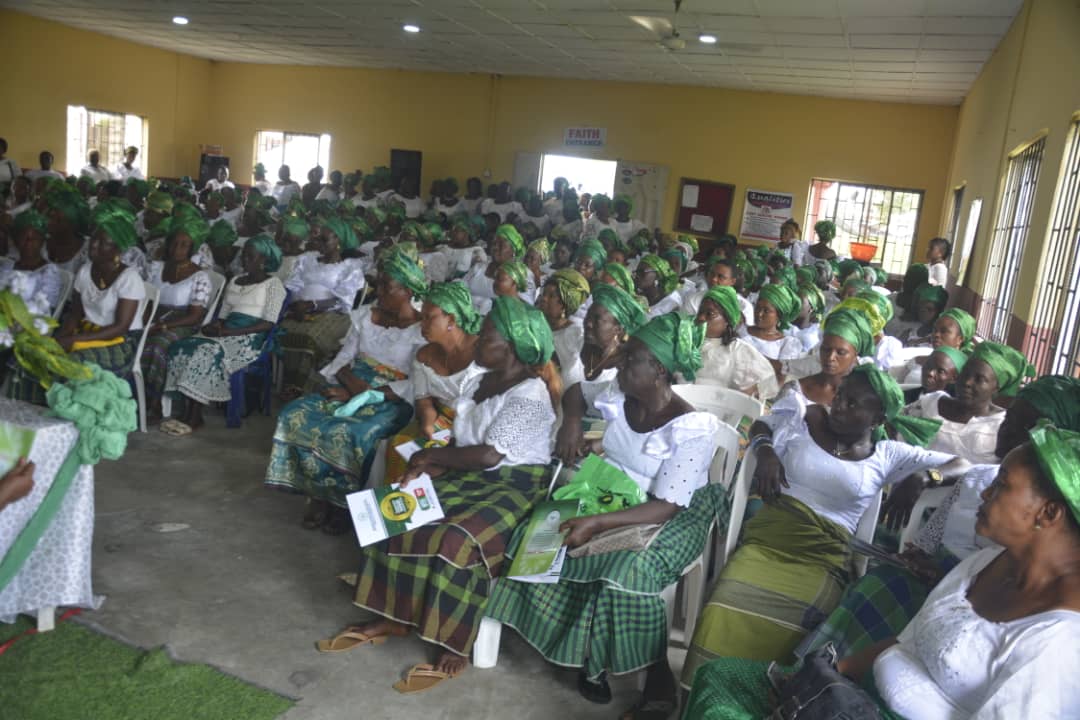Women
Breast Cancer: Need For Self Examination

The breast has become a common site for cancer to thrive in recent times. Cancer of the breast is characterised by untold pain, suffering and death. However, like cancer of the cervix, it begins slowly and takes time before causing havoc and death. Thus early detection and treatment is highly advisable. The Tide’s Women Desk, this week considers it worthwhile bringing to you what you need to know about breast cancer and the need for self examination.
What is breast self examination?
Breast self examination consists of looking and feeling one’s own breasts for any area of abnormality, such as a lump that is not painful or tender.
Why is breast self examination necessary?
It is necessary because breast cancer starts as a small painless breast lump that is often not discovered early. The sufferer does not become aware of its presence until the late stages of the cancer because it is painless. So feeling the breasts is the best way to discover the cancer early before it starts to destroy the rest of the body.
What is breast cancer?
Breast cancer is the condition in which breast tissues are destroyed because of the sudden excessive growth of its cells leading to destruction of the surrounding tissues and the spread of the cancer cells mostly through blood stream to other organs, causing further damages and subsequently death.
How is self examination done?
First, look carefully at the breasts in front of the mirror with the arms down by the sides (1) raise arms above the head. (2), use the flat surface of the fingers of the opposite side including the armpits and the area around the nipples in a circular motion, and in a circular direction while keeping the other hand firmly noshing downwards at the waist, (35) Repeat this process while lying down with the opposite arm raised above the head, (4) Then gently use two fingers to squeeze each nipple to check for any discharge from the nipples.
What are the abnormalities one may find in the breasts during breast self examination?
On looking at the breasts in the mirror –
Check for:
Change in size or shape of the breasts.
Drawing in of the Nipple
Drepressions on the surface of the breast newly visible veins observation.
Rashes or Scaling of the skin
On feeling the breasts, look out for:
Lump or thickening with the breast whether tender or not.
On squeezing the nipple watch out for:
Discharge or bleeding
Lump within the nipple
How often should breast self examination be done?
It is advisable to do breast self examination every month after a period because the breasts are less lumpy at this time. However, breast self examination can be done at any other time if discomfort is felt in the breast.
At what age should regular breast self examination start?
Breast self examination should start from the age of twenty years.
Is breast cancer common in Nigeria?
It is one of the commonest cancer that affects women. It is believed to be second to cancer of the cervix (outlet of the womb) in Nigeria. Nonetheless, it is a major public health problem in Nigeria as in other parts of the world.
Who are those prone to developing breast cancer?
The older the woman, the higher the chances of developing breast cancer.
Daughters of a woman who suffered breast cancer have higher chances of developing breast cancer.
Child bearing is known to relatively protect against breast cancer.
Longer period of breast feeding also appears to protect against breast cancer.
Are there other tests to detect breast cancer?
Yes, X-Ray examination of the breast known as mammography, also detects abnormalities in the breasts even before a lump can be felt. However, there are very few of those specialized X Ray machine in Nigeria.
What are the chances of a cure for breast cancer?
To date, there is no drug that can completely cure cancer. However, if a breast lump is discovered early to be cancer, before the cancer cells spread to other organs, removing the breast can cure the cancer.
How can you help in this campaign to save the lives of women from dying of breast cancer?
Please share this information with your friends, sisters, mothers and daughters.
Can a man develop breast cancer?
Yes. Men can also develop breast cancer but it is rare in men.
– Culled from MWAN 2016 Weeks Book.
Compiled by Sylvia ThankGod-Amadi
Women
Nigeria Deserves Stylish, Sophisticated Designs-Igiebor Daddy Lucky
IVY-K Fashion by Igiebor Daddy Lucky, a Nigerian-born designer now based in the UK, has launched the latest menswear line, Dapper Man.
One of the collection’s strengths is its classic, clean aesthetic. Dapper Man delivers sharp, structured suits in a timeless black and white color scheme that exudes a sense of luxury and professionalism. The use of high-quality fabrics like wool and silk ensures that the suits not only look high-end but also feel luxurious to the wearer. The designer’s focus on detail is evident in the meticulous tailoring, with fitted blazers and crisp trousers forming the foundation of the collection.
Where IVY-K Fashion shines is in the subtle yet elegant touches. The inclusion of beads as embellishments on lapels and cuffs adds a unique flair, blending traditional craft with modern tailoring. This nod to African heritage gives the collection a distinct identity, offering something more personal and culturally significant than your standard menswear line.
However, despite the elegance of the Dapper Man collection, there is a lingering sense of missed opportunity. The black-and-white color palette, while classic, feels overly safe. In a fashion landscape where bold colors and daring patterns often make the strongest impact, the collection could benefit from incorporating more vibrant hues or experimenting with unconventional fabrics. Pushing the envelope with color or texture could elevate these designs from simply elegant to truly memorable.
In addition, while the tailoring of the blazers and trousers is immaculate, the collection lacks a sense of playfulness or modern edge that many contemporary menswear lines are embracing. The suits are undoubtedly stylish, but the collection as a whole leans heavily on tradition. Experimenting with asymmetrical cuts, bold patterns, or even layering could add an exciting dimension to Dapper Man. The challenge is to maintain the sleek sophistication of the collection while infusing it with a fresh, innovative spirit.
Another area that could use improvement is the overall cohesion of the collection. While the suits are well-crafted, there is a feeling of repetition across the pieces. More variation in design, such as different lapel styles, pocket configurations, or even bolder accessories, would give the collection greater diversity and visual interest.
In conclusion, Dapper Man by Igiebor Daddy Lucky showcases the designer’s strong grasp of classic tailoring and elegant design, but to truly capture the attention of a broader audience, IVY-K Fashion would benefit from more daring choices. By infusing the collection with bold colors, unexpected textures, and a more modern edge, Dapper Man could move from a well-crafted line to a trendsetting force in men’s fashion. With such a solid foundation, there’s no doubt that Igiebor Daddy Lucky has the potential to lead his brand toward greater heights
Women
Women Can Curb Indecent Dressing
The trend of indecent dressing all in the name of fashion is fast becoming a norm in our generation and society at large. Most married women embrace this fashion as competition with single ladies.
Different scholars have given an in depth insight about dressing as a tool of communication. Non-verbal communication has been asserted as the communication between people by the means of signs or symbols. It conveys what we wish to disseminate to the public as either intentionally or not.
According to Paul Ekman and Michael Argyle, communication is carried out through what has been classified as “Presentational Code”. He listed nine codes of non-verbal communication, as body contact, facial expression, gestures, postures, eye movement, proximity, orientation, head nods and appearance.
This, being stated, married and single ladies should understand that their mode of dressing is communicative be it directly or indirectly as such body parts we call “private” are now being made public because of the trends or wearing of transparent dresses and this in turn calls on the attention of men who are weak and prone to illicit thoughts thus, resulting to most rape cases in our society.
This indecent dressing by most ladies has denied many their future husbands. The truth is that a man is attracted to his kind; his desires in marriage. It is often asserted that decency and beauty are in the eyes of the beholder, yet, in trending times of this 21st century, dress code and fashion in nudity form is gaining popularity.
This has become complicated as most men tend to toggle between their emotions (lust) and sanity (rationality) in terms of marriage, thereby setting a wrong foundation upon which most marriages are consummated.
On the other hand, most married women have embraced the trend of indecent dressing nipping it on the state of it being the choice dressing, approved by their spouses, leaving society with the question of what “responsible” man would prefer that the secrecy of the benefit of his marital vow has become the centre of attraction and viewership by the general public.
Hence, communicating with their dressing gas given licence to every male gender who is interested or attracted to what they see to make unsolicited sexual passes at them, which might be considered embarrassing.
At this juncture, it is important to state that ladies should dress decently knowing that they are the epitome of nation-building, they are nation-builders, character moulders and pacesetters not just in the lives of their families but to the society at large.
In most occasions, there are no clear border lines between the married women and the single ladies because of the rate of scanty dressing which has close the gap of differences.
Women and girls should embrace this call awakening to decent mode of dressing. Dresses that are meant to be worn indoors should remain indoors.
It is worrisome to see ladies wear shorts that are supposed to be worn in the living room on the streets without shame. This is an awakening call to our ladies, married and singles that the opposite sex do not expose their private body parts for the public. Sometimes, the ladies go about in the streets without wearing brazziers as to showcase their nipples.
The society should be sanitised of the menace of indecent dressing that is lurking and taking over the entire nooks and crannies of the society and the nation at large.
Let it be known that he or she is addressed in the manner he or she is dressed. There may be no room for a second impression. To the single ladies, your dressing decently will not stop you from meeting your Mr Right rather, it will increase your stake and place you on the list of most valued women in the society.
Dressing speaks louder than words.
Kate Chisom Isiocha
Isiocha is an OND final year student of Temple Gate Polytechnic.
Women
NWAPDI Launches Home Farming Scheme For Women In Okrika


